South Korea banned canine meat. So what occurs to the canine?
BBC Information
When he is not preaching the phrase of God, Reverend Joo Yeong-bong is elevating canine for slaughter.
Enterprise is just not going properly although. Actually, it is on the point of turning into unlawful.
“Since final summer season we have been making an attempt to promote our canine, however the merchants simply maintain hesitating,” Mr Joo, 60, tells the BBC. “Not a single one has proven up.”
In 2024, the South Korean authorities applied a nationwide ban on the sale of canine meat for consumption. The landmark laws, which was handed final January, offers farmers like Mr Joo till February 2027 to shutter their operations and dump their remaining animals.
However many say that is not sufficient time to section out an business which has propped up livelihoods for generations – and that authorities nonetheless have not provide you with sufficient safeguards for farmers or the estimated half one million canine in captivity.
Even those that help the ban, together with specialists and animal rights advocates, have flagged points round its enforcement – together with the issue of rehoming canine that, having been saved from the kill ground, now face the more and more possible menace of euthanasia.
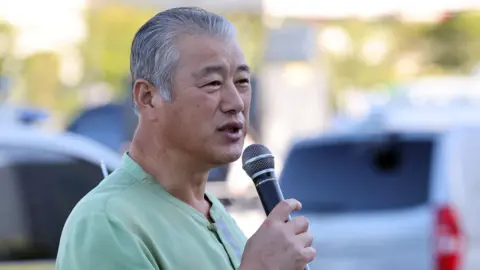 News1
News1Halfway by way of the grace interval, canine farmers are discovering themselves with a whole lot of just about unsellable animals, farms that may’t be closed, and little technique of placing meals on the desk.
“Individuals are struggling,” says Mr Joo, who can also be president of the Korean Affiliation of Edible Canine, a bunch representing the business. “We’re drowning in debt, cannot pay it off, and a few cannot even… discover new work.
“It is a hopeless state of affairs.”
A storm of obstacles
Chan-woo has 18 months to eliminate 600 canine.
After that, the 33-year-old meat farmer – who we agreed to anonymise for concern of backlash – faces a penalty of as much as two years in jail.
“Realistically, even simply on my farm, I am unable to course of the variety of canine I’ve in that point,” he says. “At this level I’ve invested all of my belongings [into the farm] – and but they aren’t even taking the canine.”
By “they”, Chan-woo would not simply imply the merchants and butchers who, previous to the ban, would purchase a median of half a dozen canine per week.
He is additionally referring to the animal rights activists and authorities who in his view, having fought so onerous to outlaw the canine meat commerce, don’t have any clear plan for what to do with the leftover animals – of which there are near 500,000, in keeping with authorities estimates.
“They [the authorities] handed the regulation with none actual plan, and now they’re saying they can not even take the canine.”
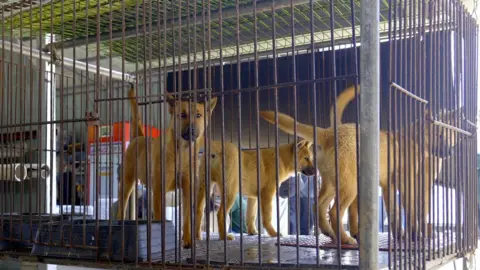 Hyunjung Kim/BBC Information
Hyunjung Kim/BBC InformationLee Sangkyung, a marketing campaign supervisor at Humane World for Animals Korea (Hwak), echoes these considerations.
“Though the canine meat ban has handed, each the federal government and civic teams are nonetheless grappling with how one can rescue the remaining canine,” he says. “One space that also feels missing is the dialogue across the canine which have been left behind.”
A spokesperson from the Ministry of Agriculture, Meals and Rural Affairs (Mafra) advised the BBC that if farm homeowners gave up their canine, native governments would assume possession and handle them in shelters.
Rehoming them, nevertheless, has confirmed difficult.
Since weight equals revenue within the canine meat business, farms are inclined to favour bigger breeds. However in South Korea’s extremely urbanised society, the place many individuals stay in residence complexes, aspiring pet homeowners usually need the alternative.
There may be additionally a social stigma related to canine that come from meat farms, Mr Lee explains, as a consequence of considerations of illness and trauma. The problem is additional difficult by the truth that many are both pure or combined tosa-inu, a breed that’s labeled as “harmful” in South Korea and requires authorities approval to maintain as a pet.
In the meantime, rescue shelters are already overcrowded.
This good storm of obstacles factors to a perverse irony: that numerous so-called rescue canine, with nowhere else to go, now face the prospect of being euthanised.
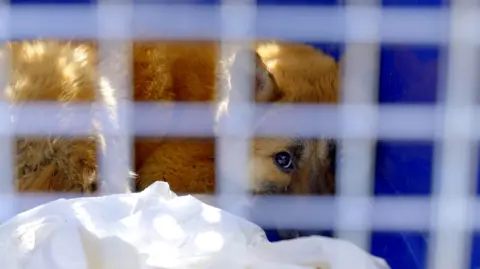 Hyunjung Kim/BBC Information
Hyunjung Kim/BBC Information“It is simply unbelievable,” says Chan-woo.
“Because the regulation was made in keeping with the calls for of those teams, I assumed they’d additionally labored out an answer for the canine – like they might take accountability for them. However now I hear that even the animal rights teams say euthanasia is the one choice.”
Cho Hee-kyung, head of the Korean Animal Welfare Affiliation, conceded in September 2024 that whereas rights teams would attempt to rescue as many animals as attainable, there would “be canine left over”.
“If remaining canine turn out to be ‘misplaced and deserted animals’ then it is heartbreaking however they are going to be euthanised,” she stated.
The federal government sought to mood these considerations weeks later, saying that euthanising animals was “actually” not a part of their plan.
Extra just lately, Mafra advised the BBC it was investing about 6bn Korean received ($4.3m; £3.2m) yearly to broaden animal shelters and help personal services, and would supply as much as 600,000 Korean received per canine ($450; £324) to farmers who shut their companies early.
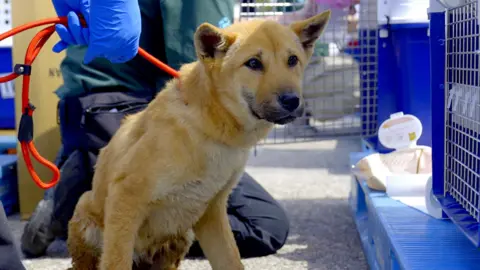 Hyunjung Kim/BBC Information
Hyunjung Kim/BBC InformationHowever Chun Myung-Solar, director of the Workplace of Veterinary Medical Training at Seoul Nationwide College, agrees that the federal government’s broader plan for leftover canine is basically missing.
“There must be a concrete dialogue about how one can ‘dispose’ of the canine,” she says.
“Each adoption and euthanasia ought to be on the desk. [But] if we have gone to the trouble of rescuing canine from merciless slaughter solely to euthanise them, it is comprehensible that folks would really feel heartbroken and indignant.”
A livelihood unravels
Some have seemed for options additional afield, sending the animals abroad to extra prepared adopters in international locations like Canada, United Kingdom and the US.
In 2023, a workforce from Hwak rescued some 200 canine from a farm in Asan metropolis – all of which have since been despatched to Canada and the US.
The previous proprietor of that farm, 74-year-old Yang Jong-tae, advised the BBC that as he watched the rescuers loading his canine into their vans, he was astonished by the extent of compassion they confirmed.
“After I noticed how they dealt with the animals – like they had been dealing with folks, so gently and lovingly – it actually moved me,” he stated.
“We do not deal with them like that. For us, elevating canine was only a technique to make a residing. However these folks from the animal group handled the canine like they had been people with dignity, and that actually touched my coronary heart.”
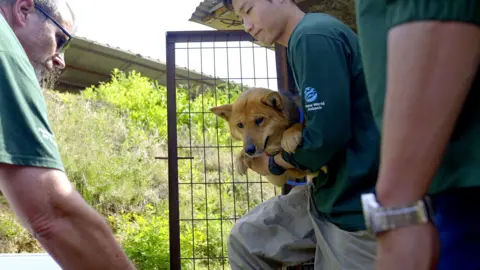 Hyunjung Kim/BBC Information
Hyunjung Kim/BBC InformationMr Yang hastened so as to add, nevertheless, that he disapproves of the ban on canine meat farming.
“If canine meat is banned as a result of canine are animals, then why is it okay to eat different animals like cows, pigs or rooster?” he stated. “It is the identical factor. This stuff exist in nature for folks to stay on.”
Consuming canine is just not the identical as consuming different meats, in keeping with Ms Chun. She factors out that canine meat carries extra threat from a meals security and hygiene perspective – particularly in South Korea, the place it has not been built-in into the formal, regulated meat manufacturing system.
And whereas consumption charges have fluctuated all through Korea’s historical past, it has turn out to be more and more taboo lately.
A authorities ballot from 2024 discovered solely 8% of respondents stated they’d tried canine meat within the earlier 12 months – down from 27% in 2015. About 7% stated they might maintain consuming it up till February 2027, and about 3.3% stated they might proceed after the ban got here into full impact.
In the meantime, as of June 2025, 623 of South Korea’s 1,537 canine farms had closed.
“As society and tradition have developed, South Korean society has now made the choice to cease producing canine meat,” Ms Chun says.
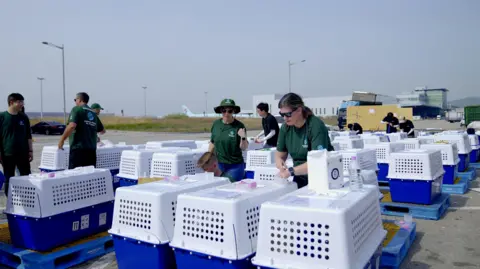 Hyunjung Kim/BBC Information
Hyunjung Kim/BBC InformationAnd but for a lot of it stays the cornerstone of an business on which they’ve constructed their lives.
Each member of the canine meat commerce the BBC spoke to expressed uncertainty about how they might help themselves now that their longtime livelihood has been deemed unlawful.
Some say they’ve resigned themselves to lives of poverty, noting that they had been born throughout the Korean Warfare and knew how one can stay hungry. Others steered that the commerce may go underground.
Many agree, nevertheless, that for youthful farmers the crackdown is especially worrying.
“Younger folks on this business are actually going through a bleak actuality,” Mr Joo says. “Since they can not promote the canine, they can not shut down rapidly both. They’re caught, with no approach ahead or again.”
Chan-woo remembers that when he began working within the business a decade in the past, at 23, “The notion of canine meat wasn’t that destructive”.
“Nonetheless,” he provides, “There have been some feedback from folks round me, so even again then I used to be conscious that it wasn’t one thing I may do for the remainder of my life.”
The ban got here faster than he anticipated – and since its announcement, he says, “Making a residing has turn out to be extremely unsure”.
“All we’re hoping for now’s that the grace interval could be prolonged in order that the method [of dealing with the remaining dogs] can occur extra regularly.”
Many others are hoping for a similar. However because the canine meat business is pulled out from underneath the toes of those that’ve come to depend on it, Mr Joo can not help however speculate on a grim thought: that some farmers could not be capable to endure the uncertainty for for much longer.
“Proper now, persons are nonetheless holding on, hoping one thing may change – perhaps the grace interval will probably be prolonged,” he says. “However by 2027, I actually imagine one thing horrible will occur.
“There are such a lot of folks whose lives have fully unravelled.”


